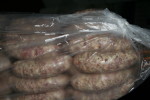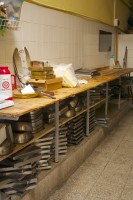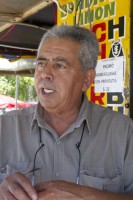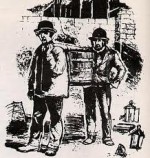 In 1859, The Curiosities of Food was published in London by Peter Lund Simmonds. Simmonds joined other Londoners at that time, such as George Dodd, author of The Food of London, in a quest to understand food at home and abroad. By then, four hundred million people had been added to the British Empire, each nation bringing a food culture that seemed exotic to the ordinary Victorian. Simmonds wrote the first truly global account of food, one that reflected a fascination with all things foreign.
Following Read more [...]
In 1859, The Curiosities of Food was published in London by Peter Lund Simmonds. Simmonds joined other Londoners at that time, such as George Dodd, author of The Food of London, in a quest to understand food at home and abroad. By then, four hundred million people had been added to the British Empire, each nation bringing a food culture that seemed exotic to the ordinary Victorian. Simmonds wrote the first truly global account of food, one that reflected a fascination with all things foreign.
Following Read more [...] Curious about the Curious
Reply
 In 1859, The Curiosities of Food was published in London by Peter Lund Simmonds. Simmonds joined other Londoners at that time, such as George Dodd, author of The Food of London, in a quest to understand food at home and abroad. By then, four hundred million people had been added to the British Empire, each nation bringing a food culture that seemed exotic to the ordinary Victorian. Simmonds wrote the first truly global account of food, one that reflected a fascination with all things foreign.
Following Read more [...]
In 1859, The Curiosities of Food was published in London by Peter Lund Simmonds. Simmonds joined other Londoners at that time, such as George Dodd, author of The Food of London, in a quest to understand food at home and abroad. By then, four hundred million people had been added to the British Empire, each nation bringing a food culture that seemed exotic to the ordinary Victorian. Simmonds wrote the first truly global account of food, one that reflected a fascination with all things foreign.
Following Read more [...]  During a recent visit with a meat processor and a pig farmer in Argentina , I heard two men tell me stories that were disarming. Their stories seemed more suited to pass between intimate friends and unlikely to pass between us, having only met for a few hours. The stories, while they revealed how chorizo is made, were far more eloquent about their lives than about sausage or animal husbandry.
While we’re exploring the food supply chain, we’re often confronting machines, technology, the gears
During a recent visit with a meat processor and a pig farmer in Argentina , I heard two men tell me stories that were disarming. Their stories seemed more suited to pass between intimate friends and unlikely to pass between us, having only met for a few hours. The stories, while they revealed how chorizo is made, were far more eloquent about their lives than about sausage or animal husbandry.
While we’re exploring the food supply chain, we’re often confronting machines, technology, the gears  January is just about the worst time to meet the owner of a bakery in Buenos Aires, or any business owner, for that matter. Marcelo, the owner of La Sud América, a bakery in the Almagro neighborhood in Buenos Aires, was texting me with the news that he would be available for a brief meeting before he taking off for a holiday with his family. Like our summer months, Argentinian winters are prime vacation months for families with children out of school, which means that many businesses hang a
January is just about the worst time to meet the owner of a bakery in Buenos Aires, or any business owner, for that matter. Marcelo, the owner of La Sud América, a bakery in the Almagro neighborhood in Buenos Aires, was texting me with the news that he would be available for a brief meeting before he taking off for a holiday with his family. Like our summer months, Argentinian winters are prime vacation months for families with children out of school, which means that many businesses hang a  Most food in Argentina comes from somewhere else, at least in its earliest forms. Like wheat. Sure, there’s asado, an ubiquitous dish on Argentinian menus that is mostly a mound of barbequed meat. But in Argentina, the mishmash of culinary traditions that exists today reflects a long history of immigrants who left very little of anything that can be called truly Argentinian.
The view that the Argentinian national cuisine is actually a mix of British, Italian, and French food can be galling
Most food in Argentina comes from somewhere else, at least in its earliest forms. Like wheat. Sure, there’s asado, an ubiquitous dish on Argentinian menus that is mostly a mound of barbequed meat. But in Argentina, the mishmash of culinary traditions that exists today reflects a long history of immigrants who left very little of anything that can be called truly Argentinian.
The view that the Argentinian national cuisine is actually a mix of British, Italian, and French food can be galling  Pedro Molina’s white teeth reflect the Argentinian sun making a steady gaze into his eyes almost unbearable. For some reason, his smile reveals only his lower teeth, gleaming and even. Sitting in Buenos Aires under one of the umbrellas that shade the tables surrounding his stand, Pedro speaks with a low, soft voice as he describes his life as a vendor of choripán, a combination of chorizo and pane (bread), the two main ingredients of the classic Argentinian sandwich. Pedro flashes his bright smile
Pedro Molina’s white teeth reflect the Argentinian sun making a steady gaze into his eyes almost unbearable. For some reason, his smile reveals only his lower teeth, gleaming and even. Sitting in Buenos Aires under one of the umbrellas that shade the tables surrounding his stand, Pedro speaks with a low, soft voice as he describes his life as a vendor of choripán, a combination of chorizo and pane (bread), the two main ingredients of the classic Argentinian sandwich. Pedro flashes his bright smile  Can Food Be Too Local?
While shooting your own dinner is the sine qua non of localness, you should be allowed to draw the line. At Kelmscott Farm, I raised farm animals that met their death for the sake of high-end restaurants. This past weekend, I was shooting birds for sport, and yes, for food. But pulling the trigger put my meal just too close for comfort.
I joined a group of women who, judging from their gun bags and hunting attire, were experienced hunters. I, on the other hand, arrived
Can Food Be Too Local?
While shooting your own dinner is the sine qua non of localness, you should be allowed to draw the line. At Kelmscott Farm, I raised farm animals that met their death for the sake of high-end restaurants. This past weekend, I was shooting birds for sport, and yes, for food. But pulling the trigger put my meal just too close for comfort.
I joined a group of women who, judging from their gun bags and hunting attire, were experienced hunters. I, on the other hand, arrived  OK, it's just a knish, but a recent factory fire in New York put the kibosh on knishes. While the loss of knish production, 15 million a year from this one factory, is a raw deal for a food producer, the interruption in the knish supply chain illustrates how events such as a factory fire impact our food system.
The factory owners say that they will be making their famous square Coney Island knishes again by Thanksgiving. They will now be in the thick of adaptations that will stress every aspect
OK, it's just a knish, but a recent factory fire in New York put the kibosh on knishes. While the loss of knish production, 15 million a year from this one factory, is a raw deal for a food producer, the interruption in the knish supply chain illustrates how events such as a factory fire impact our food system.
The factory owners say that they will be making their famous square Coney Island knishes again by Thanksgiving. They will now be in the thick of adaptations that will stress every aspect  Trust matters. As we study what makes our food system work, we find that enduring human relationships are the sinews that flex when the system is disrupted. Social media may be our new tool for building relationships, but speed may not replace our old, slow method of building trust.
Transactions based on trust make the food world go 'round. Food producers, processors, and distributors depend upon relationships built over time that result in trusted transactions and confidence in credit, quality,
Trust matters. As we study what makes our food system work, we find that enduring human relationships are the sinews that flex when the system is disrupted. Social media may be our new tool for building relationships, but speed may not replace our old, slow method of building trust.
Transactions based on trust make the food world go 'round. Food producers, processors, and distributors depend upon relationships built over time that result in trusted transactions and confidence in credit, quality,  The Radio Lab recently featured a podcast called "Poop Train." Guaranteed to grab your attention, the title referred to a system used by cities to eliminate human waste water. Surprisingly, we learn from the podcast that it wasn't until the 1980s that New York City stopped dumping treated human waste into the ocean. Gradually, the treatment facilities improved and the resulting sludge was transported to farmers around the U.S. to dress their fields. Because the costs were so high to transport the
The Radio Lab recently featured a podcast called "Poop Train." Guaranteed to grab your attention, the title referred to a system used by cities to eliminate human waste water. Surprisingly, we learn from the podcast that it wasn't until the 1980s that New York City stopped dumping treated human waste into the ocean. Gradually, the treatment facilities improved and the resulting sludge was transported to farmers around the U.S. to dress their fields. Because the costs were so high to transport the  At a recent gathering in downtown Austin, the breakfast fare said it all. Organic yogurt, locally produced honey, fresh breakfast tacos broke from the usual offerings of croissants and Danish pastries. This crowd was invested in their food, mostly emotionally, some economically, as farmers, chefs, city planners, food activists, non-profits, and individuals gathered to learn about the possibility of a public food market in Austin.
Austin has farmers markets but no public market, yet. And even the
At a recent gathering in downtown Austin, the breakfast fare said it all. Organic yogurt, locally produced honey, fresh breakfast tacos broke from the usual offerings of croissants and Danish pastries. This crowd was invested in their food, mostly emotionally, some economically, as farmers, chefs, city planners, food activists, non-profits, and individuals gathered to learn about the possibility of a public food market in Austin.
Austin has farmers markets but no public market, yet. And even the